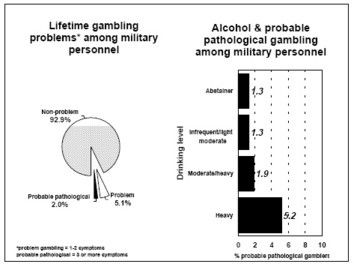The fifth in a series of surveys of active duty military personnel was conducted by the Research Triangle Institute in 1992 under the direction of the Department of Defense to examine substance abuse and health behaviors*. The 1992 survey was the first to include questions about problem gambling. Researchers hypothesized that problems related to excessive gambling could affect the financial and psychological well-being of military personnel, which could have a negative effect on military readiness. The majority of the 16,395 respondents were male (85%), white (66.9%), educated through high school or beyond (99.5%), age 34 or younger (76.3%), and married (62.6%). Respondents were asked whether they had ever had any of eight gambling-related problems (modified from the DSM-III-R). One or more affirmative answers indicated problem gambling, while three or more met the criteria for probable pathological gambling. In their lifetime, 7.1% of military personnel had at least one of the gambling-related problems; 2.0% met criteria for probable pathological gambling. A significant limitation of these findings is the choice of lifetime rates of disordered gambling. This choice makes it impossible to determine the proportion of military personnel who experienced gambling problems before entering the military and the proportion who begin or continue disordered gambling behavior while in the military. In addition, three affirmative answers on the problem gambling items does not provide any information about whether these problems occurred as a cluster. If they occurred at separate times in any one respondent’s lifetime, it implies gambling-related problems in a lifetime, but not necessarily pathological gambling behavior. Researchers also examined the relationships between alcohol use and gambling activity. Problems with gambling were more common among heavier drinkers than among abstainers and light drinkers. However, nearly 90% of heavy drinkers had never experienced any problems with gambling. In lifetime gambling problems* among military personnel, compared to alcohol & probable pathological gambling among military personnel, probable pathological gamblers were more represented in the group that received alcohol treatment than in the group that did not receive alcohol treatment (4.8%vs. 1.7%).
Source: *Bray, R., Kroutil, L.A., Luckey, J.W., Wheeless, S.C., Iannacchoine, V.G., Anderson, D.W., Marsden, M.E., & Dunteman, G.H. (1992). 1992 worldwide survey of substance abuse and health behaviors among military personnel. Springfield, VA: U.S. Department of Commerce, National Technical Information Service.
This public education project is funded, in part, by The Andrews Foundation.





